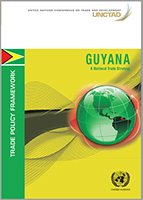Trade Policy Framework: Guyana

Trade policy encompasses the development and implementation of national laws, regulations, and standards to facilitate, promote or otherwise support trade relations between countries and the crossborder movement of tradeables. Effective trade policy is both a prerequisite for and a consequence of the negotiation and implementation of bilateral and multilateral trade agreements between and among countries.
Making policy in this important and growing field is especially critical for small developing economies like Guyana whose productive capacity and consumption highly depend on imports and whose income including government revenue depends on export earnings. It is, thus, pertinent that policymaking be guided by an overall strategic vision.
This document provides an in-depth analysis of what may be a new trade strategy for Guyana.
The study replaces an earlier strategy that was introduced in 2003. It provides an overarching vision of the principles and procedures for the long-term development of the country’s trade, based on principles of competitiveness, transparency and the optimum use of Guyana’s resources.
This trade strategy is set out in three steps.
The first is to offer a factual overview of the evolution and status of Guyana’s position in the global economy, so as to identify the most significant challenges and opportunities that the country faces.
The second is to outline a framework of options to enable Guyana to deal with these challenges and opportunities.
The third is to offer guidance on the choices that the country might wish to make, dividing these into two types: (i) on those issues that fall strictly within the scope of trade policy, such as export taxes, the strategy makes specific recommendations; and (ii) on other topics that involve wide interagency collaboration the strategy does not make a precise recommendation but suggests more detailed examination of the issues.


